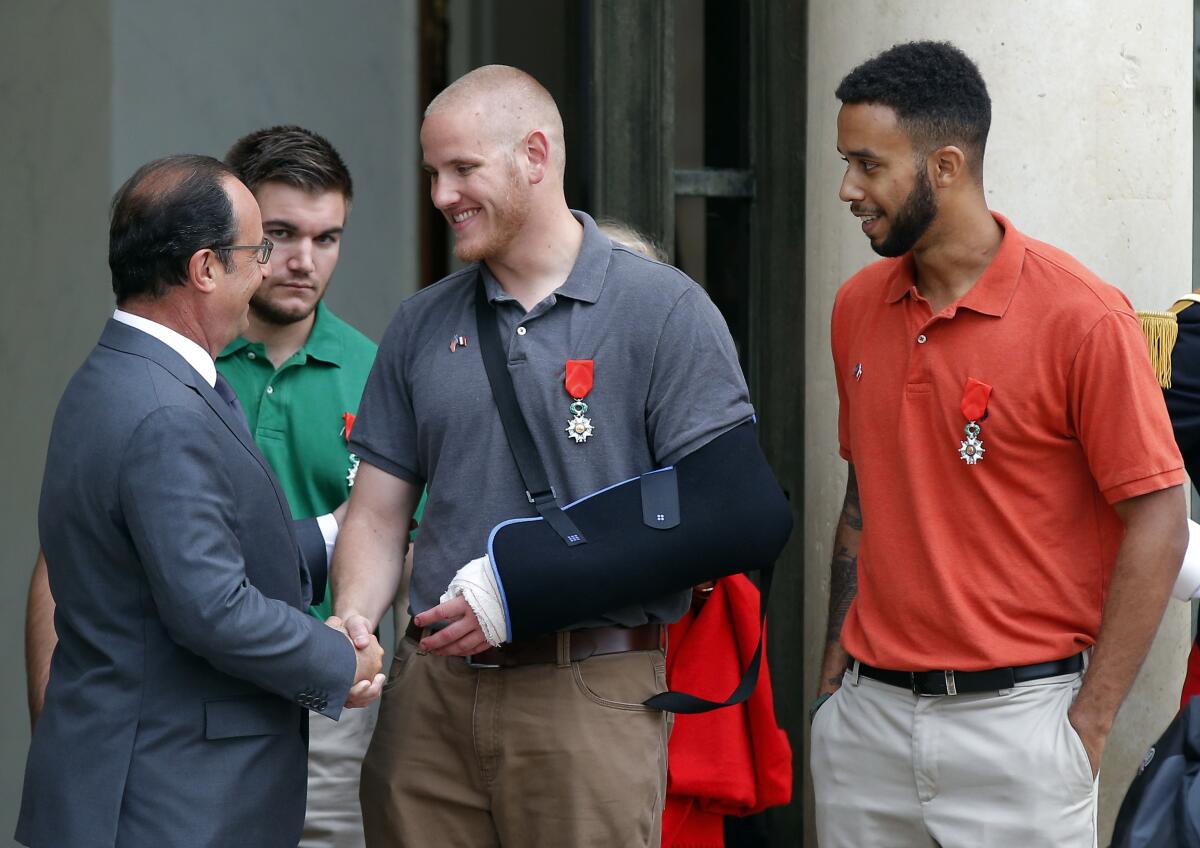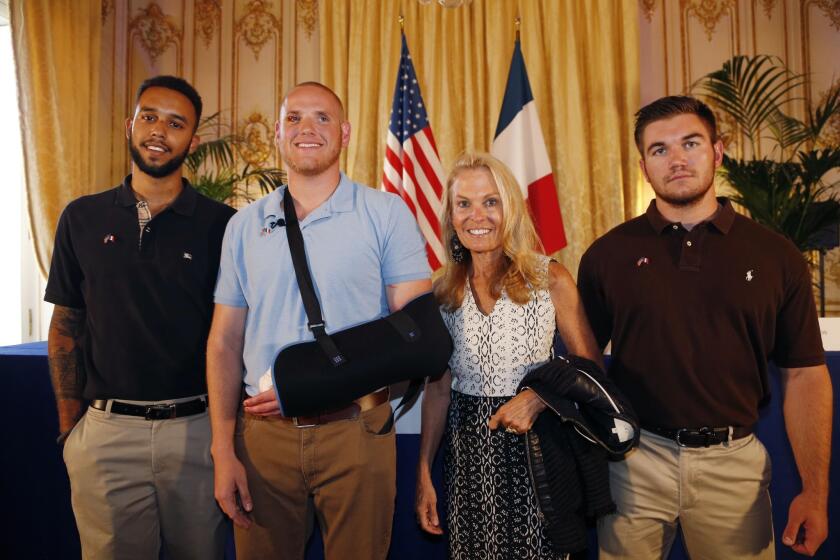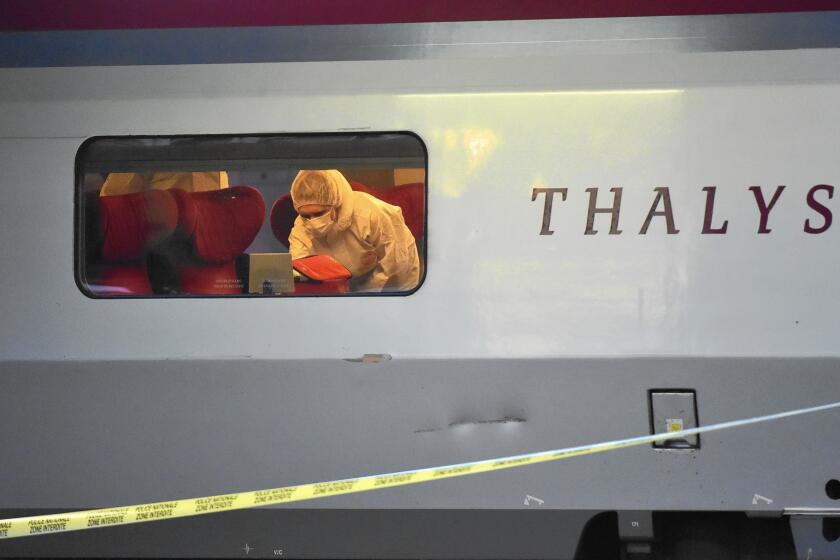Trial in Europe train attack foiled by 3 California friends opens in France

- Share via
PARIS — An Islamic State operative accused of an attack on a European train that was stopped by three young vacationers from California went on trial Monday in France on terrorism charges.
Opening the trial of Ayoub Khazzani, the judge said that the 31-year-old Moroccan, who had ties to a notorious terror mastermind, intended to “kill all the passengers” aboard the fast Amsterdam-to-Paris train in 2015 but “lost control of events.” One of the young men who helped subdue Khazzani told investigators that the shirtless gunman seemed high on drugs and “completely crazy,” the judge said.
The dramatic story of how Khazzani was brought down by the three American friends was turned into the Hollywood thriller “The 15:17 to Paris” by Clint Eastwood. Khazzani’s trial is expected to last a month, with testimony expected from the two U.S. servicemen and their friend, who were hailed as heroes and granted French citizenship.
Eastwood has also been summoned to appear Nov. 23. It’s unclear whether the four men will testify in the Paris courtroom or by video.
During the failed August 2015 attack, Khazzani swaggered bare-chested through the train with an arsenal of weapons. He shot one passenger before the trio of traveling Americans — Alek Skarlatos, Spencer Stone and Anthony Sadler — tackled and helped subdue him.
Khazzani is charged with attempted terrorist murder and, if convicted, faces a maximum sentence of life in prison.
Khazzani bought a train ticket at the Brussels station Aug. 21, 2015, for a 5:13 p.m. departure. He was armed with a Kalashnikov, nine clips with 30 rounds each, an automatic pistol and a cutter, according to investigators.
“He seemed like he was ready to fight to the end. So were we.”
Once on the train, he lingered in a restroom between cars and emerged bare-chested with a Kalashnikov. One waiting passenger struggled with the attacker. A French American, Mark Moogalian, then wrestled the Kalashnikov away before being shot by a pistol as he headed to Car No. 12 to warn his wife. Moogalian said in interviews later that the attacker recovered the Kalashnikov.
Stone, then a 23-year-old U.S. airman, said after the attack that he was coming out of a deep sleep when the gunman appeared. Skarlatos, then a 22-year-old U.S. National Guardsman recently back from Afghanistan, “just hit me on the shoulder and said, ‘Let’s go.’” Sadler, 23, who was a college senior at Sacramento State, joined them.
The three Californians snapped into action out of what Skarlatos said afterward was “gut instinct.” Stone and Skarlatos moved in to tackle the gunman and take his gun. Sadler helped subdue him. Stone said he choked Khazzani unconscious. A British businessman then joined in the fray.
Stone, whose hand was injured by the cutter, is also credited with saving Moogalian, whose neck was squirting blood. Stone said he “just stuck two of my fingers in his hole and found what I thought to be the artery, pushed down and the bleeding stopped.”
In 1921, Louis Sonney, having single-handedly captured bandit Roy Gardner, “the most hunted man in Pacific Coast history,” played himself in a film called “Crime Doesn’t Pay” and toured the nation with it on the Pantages vaudeville circuit.
The train rerouted to Arras, in northern France, where Khazzani was arrested.
The three American friends’ lawyer, Thibault de Montbrial, said at the courthouse Monday that their “very brave intervention” had thwarted a “slaughter.”
“This terror attack could have killed up to 300 people based on the [amount] of ammunition that was found on the terrorist and in his bag,” he said.
Khazzani’s lawyer, Sarah Mauger-Poliak, said her client “regrets having allowed himself to become indoctrinated” by extremist propaganda and wants “to demonstrate his remorse.”
They were childhood pals on a European jaunt, three young Americans who began the day as tourists and ended it as heroes praised by the presidents of two countries.
The foiled attack occurred three months before the coordinated terrorist assault on Paris, in November 2015, that left 130 people dead. The man considered the likely mastermind of the Paris attacks, Abdel Hamid Abaaoud, was also the behind-the-scenes force in the train attack, which was planned in Syria, according to the prosecution.
Abaaoud traveled from Syria to Belgium with Khazzani to organize attacks in Europe, and was holed up with him and an accomplice in a Brussels apartment, according to the prosecution. Abaaoud was killed by French special forces days after the Paris attacks.
Khazzani told investigators that Abaaoud had wanted him to kill only the American military men aboard the train — a line of argument he is expected to maintain during the trial. But prosecutors say it is a dubious assertion, in part because the servicemen’s presence on the train couldn’t be known in advance and they were in civilian clothes.
That defense also does not jibe with Abaaoud’s goal of killing a maximum number of people during attacks.
Breaking News
Get breaking news, investigations, analysis and more signature journalism from the Los Angeles Times in your inbox.
You may occasionally receive promotional content from the Los Angeles Times.
Three others who weren’t on the train also are being tried for their roles as alleged accomplices.
Bilal Chatra, 24, an Algerian member of Islamic State, would have been the second man on the train with Khazzani but dropped out of the plot a week earlier. He had left Syria for Europe the week before to set up the exit route.
Mohamed Bakkali allegedly took in the Europe-bound attackers in Budapest, Hungary, which he denies. He and Chatra were arrested in Germany in 2016. A third man, Redouane El Amrani Ezzerrifi, allegedly piloted a boat to help in their return to Europe.
More to Read
Sign up for Essential California
The most important California stories and recommendations in your inbox every morning.
You may occasionally receive promotional content from the Los Angeles Times.















